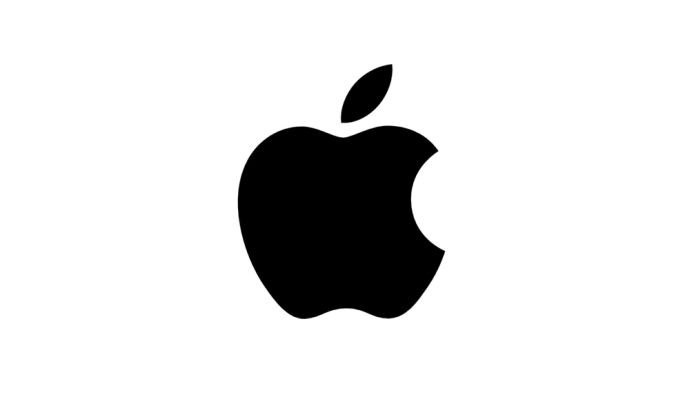Traditional search engines are broken — can AI help?
Can AI save search engines from spam and ads?
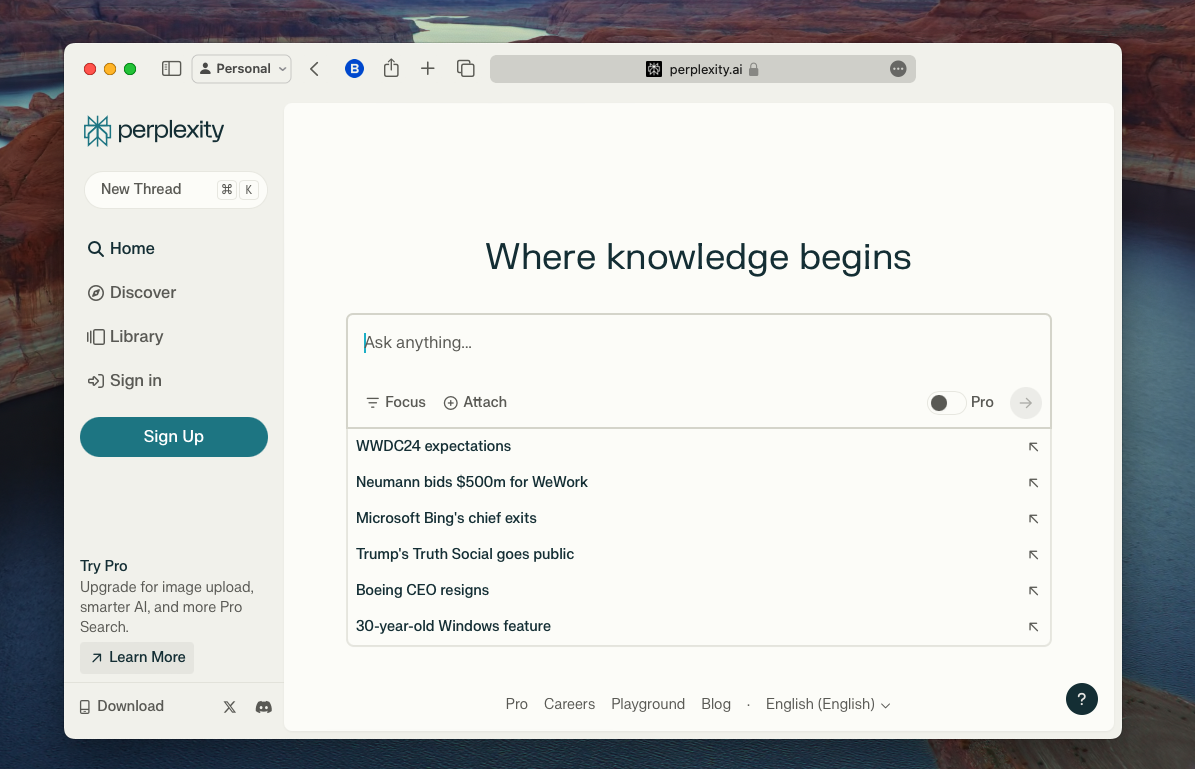
Sign up to receive The Snapshot, a free special dispatch from Laptop Mag, in your inbox.
You are now subscribed
Your newsletter sign-up was successful
Traditional search engines are broken. For decades, platforms like Google have let me track down an answer from the internet’s trillions of URLs in under ten blue links. But lately, I’ve had to venture past that first set of results far more. What I’m looking for now often is either buried under rows and rows of ads or outranked by spammy AI-generated websites.
I’m not just imagining it: a recent study demonstrated that search engines such as Google, Bing, and DuckDuckGo are less helpful than ever, and "a torrent of low-quality content” is “drowning any kind of useful information.”
When I look up “Japanese knives” on Google, for example, I have to scroll past half a dozen rows of ads and product carousels to access organic links. It’s no surprise then that younger users have turned to appending their search queries with “Reddit” and “TikTok” to seek advice from authentic — read not optimized for a search engine — experiences.
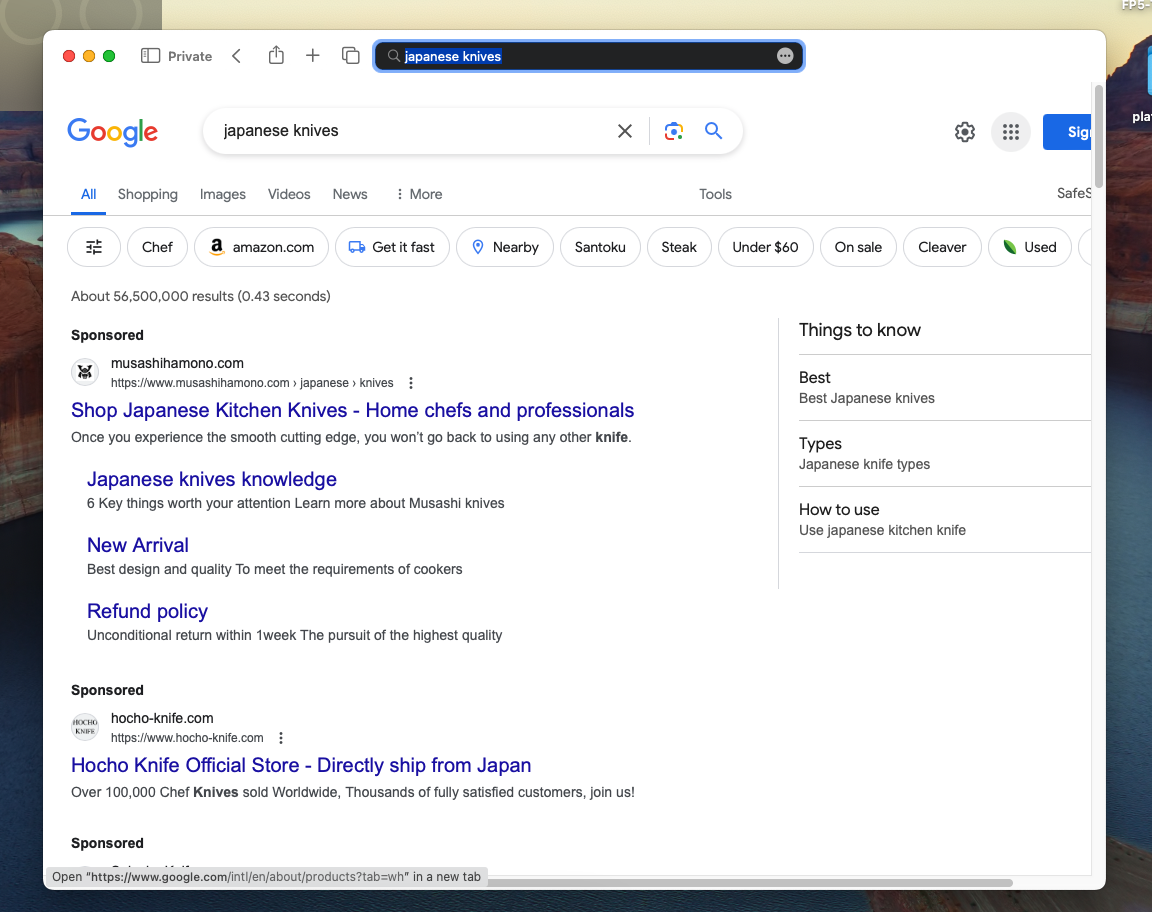
For larger platforms like Google, especially, it’s not only that artificially generated content has made it effortless to spawn SEO-friendly spam websites, but also that their business models are invariably at odds with their ability to offer the best search experience. Their priority isn’t to find your needle in the haystack for you; it is to boost their ad revenue and promote their in-house products like YouTube and dedicated shopping grids. Can AI take over that mantle instead?
Can AI "fix" search?
Truth be told, I’ve had my reservations about this. After all, much of the latest decline in search quality is due to AI-generated content itself. But over the past few months, scores of new promising startups have come up hoping to revolutionize web search.
While incumbents such as Google and Bing have too begun to offer AI services in their search results, they’re still in preview and I’ve had issues with their accuracy. Not to forget each has been found promoting questionable sources. So I turned to Perplexity AI instead. It’s a Jeff Bezos-backed conversational search engine that takes advantage of the tech behind ChatGPT to generate answers to your queries. It already has about 10 million monthly users, which though is a far cry from Google’s 1.5 billion, is exponentially more than previous startups like Neeva, a search engine from the former head of Google’s ad business. Here’s what was it like to use it.

Perplexity AI looks and functions like pretty much every other search engine you may have tried. Much of its homescreen is a white blank space and in the center, there’s an empty search bar. Those similarities end once you look up a query. Unlike Google and Bing, which bring up a list of links, Perplexity AI only shows you the generated answers and the sources it used. In the result, you’ll also find related images, options to search videos, upload a document to analyze, and AI-generate a picture, and similar queries.
Sign up to receive The Snapshot, a free special dispatch from Laptop Mag, in your inbox.
What especially sets Perplexity AI’s interface apart is one, it puts source links at the top front and center, unlike Bing and Google where they’re positioned more as footnotes, and two, the follow-up bar, which allows you to ask another related question without having to re-enter the details and the context. For example, if I search for “best laptops” and then want suggestions tailored for students, I can simply enter “for students” in the follow-up field.
In most searches, Perplexity AI’s answers were satisfactory and didn’t make me rush to Google right away. It usually picks reputable sources by using a combination of its own, Google’s, and Bing’s page ranking systems. To my surprise, even after dozens of queries, Perplexity AI also didn’t hallucinate or make up an answer, unlike ChatGPT itself. For many queries, I even preferred it over Google. When I searched for “by how many votes did Biden win in 2020,” for example, Perplexity AI came up with a precise figure, while Google brought up news links and its AI-generated panel refused to work.
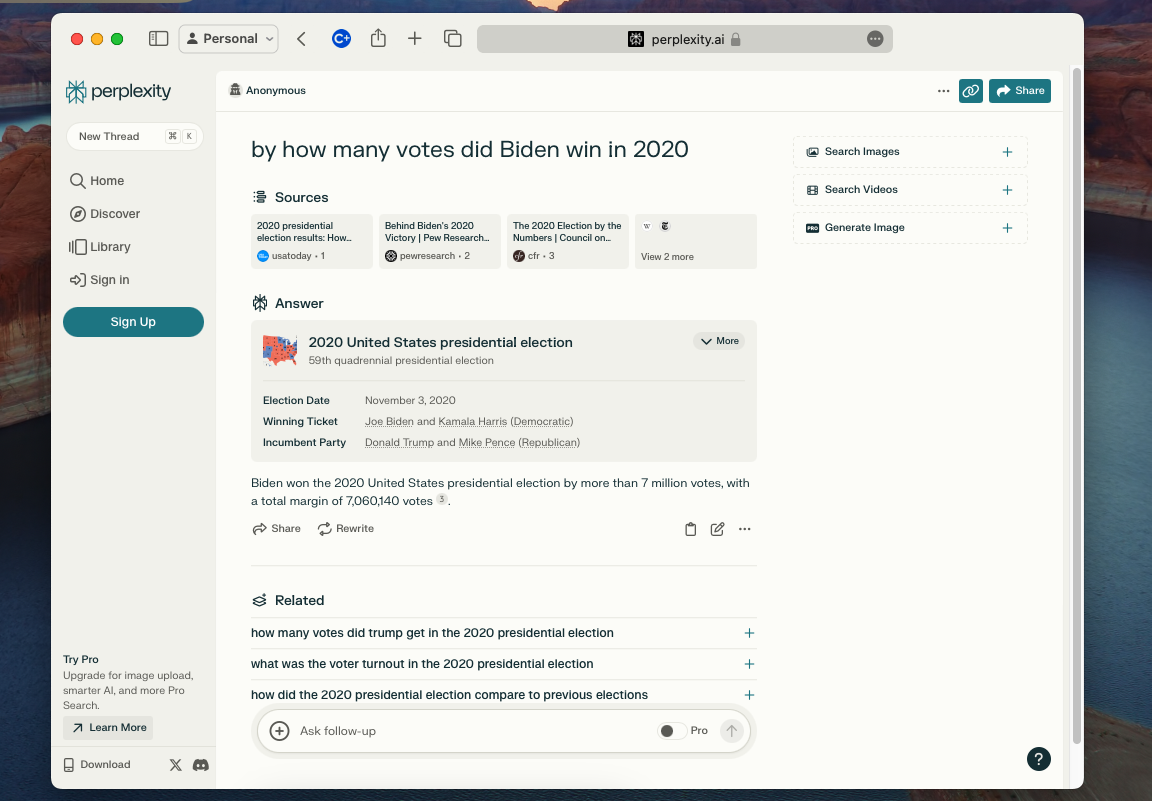
I found Perplexity AI works best for summarizing historical information. But for real-time data, especially those which are ongoing, it’s rarely on top. While researching the Indian Wells tennis competition, I asked it in which round was a particular player eliminated, and it oddly gave me information for another event, the Australia Open. Google, in comparison, has interactive widgets built into its search results for real-time information and those so far have proved more productive at navigating event news. Perplexity AI’s auto-complete is also not yet up to the mark and I often have to type in the entire query, which most of us rarely do on Google.
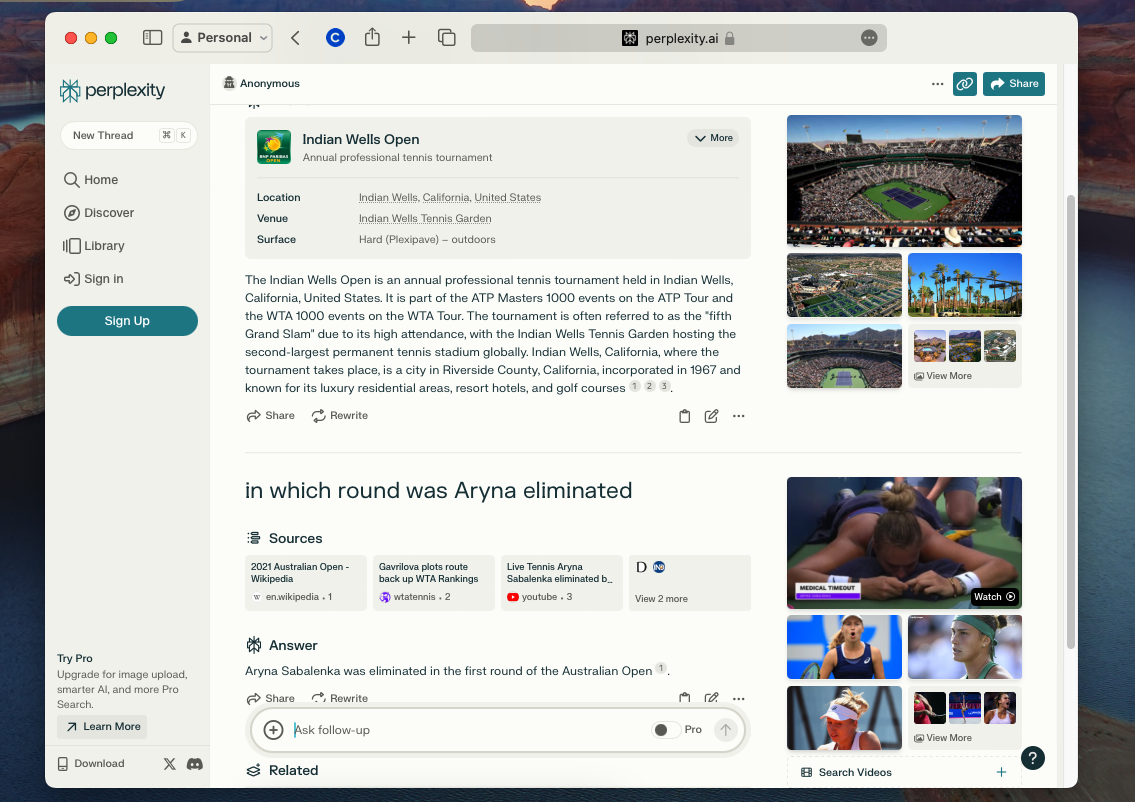
In addition, I wish it was still possible on Perplexity to browse a few more source links instead of relying on a summary. That comes in handy when you’re looking for a website’s address instead of a piece of information.
My time with Perplexity AI indicated Google is certainly in need of an overhaul but at the time, I wasn’t convinced a search engine that summarizes the top results was the best solution. What if a bot browsed the web for you?
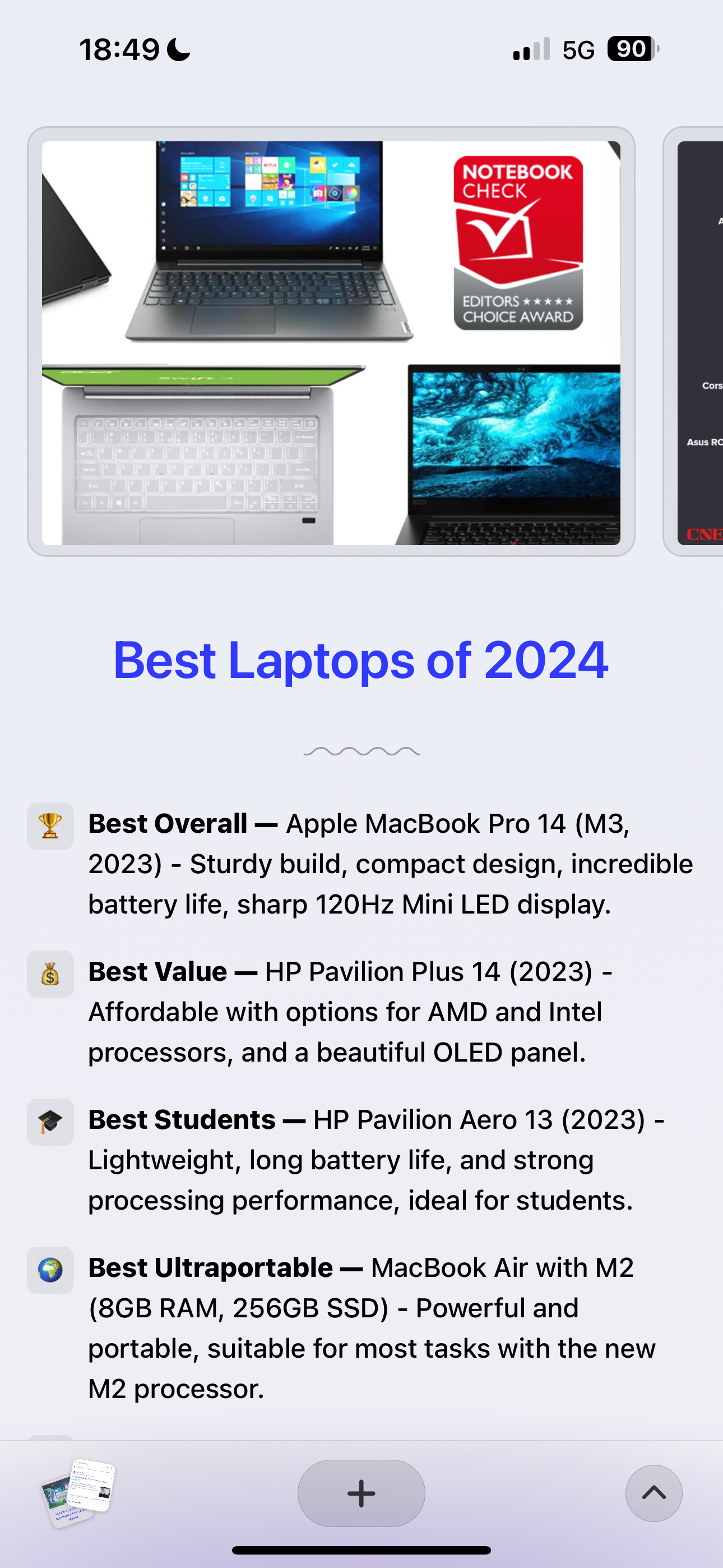

Is an AI bot the answer?
That’s the idea behind Arc Search, an iOS-exclusive app from The Browser Company, which also makes the much-hyped Arc browser. Arc Search surfs the top Google results for a query and builds a neat, little website-like page from the information for you. For a “best laptops” search, its result will include a section with summaries for a few recommended laptops followed by which models stand out in a particular category like “Best Value,” and more. I appreciated the additional data Arc Search offers over Perplexity AI and what’s impressive is it only appears if you scroll past the main generated answer.
Bottom line
Though I found the AI-aided search experience compelling, I won’t be quitting Google anytime soon. However, in many cases, I’ve begun to reach for Perplexity AI and Arc Search more than I expected, especially on my phone, where I’m often in a hurry and don’t have the screen real estate to go through a bunch of links.
That said, while the current state of search is dire, I doubt AI-powered engines will be the ultimate answer. They go against the web’s fundamental pillar and fail to compensate the open websites they depend on. Without them, there are no sources and summaries. Up until now, neither Perplexity AI nor any of the other startups like Arc have managed to answer how they’ll share their revenue once websites begin to lock up their content. AI may help dig for that needle but in the process, it’s also lighting the haystack on fire for now.
Shubham Agarwal is a freelance technology journalist from Ahmedabad, India. His work has previously appeared in Business Insider, Fast Company, HuffPost, and more. You can reach out to him on Twitter.

